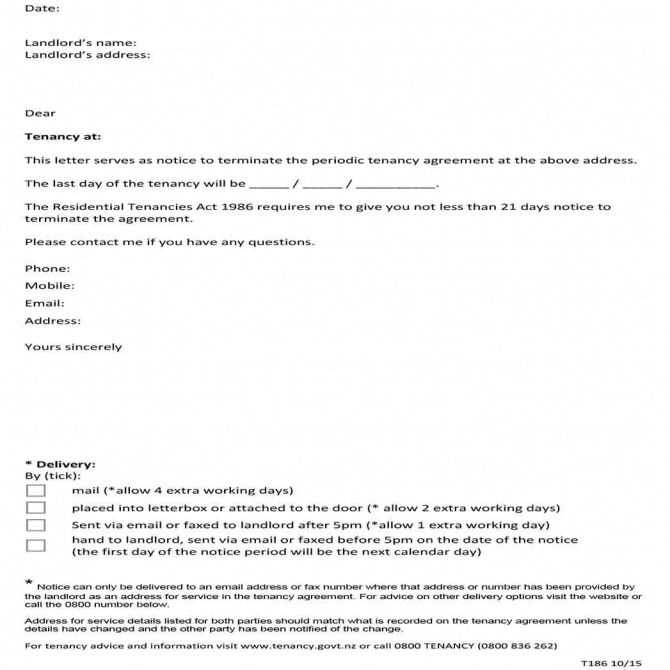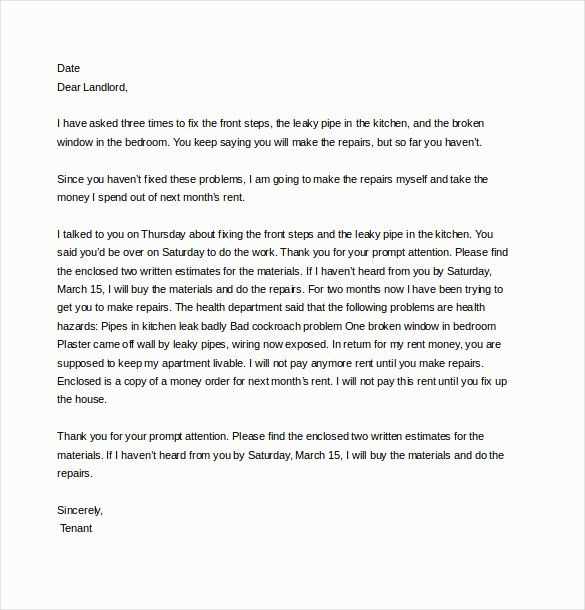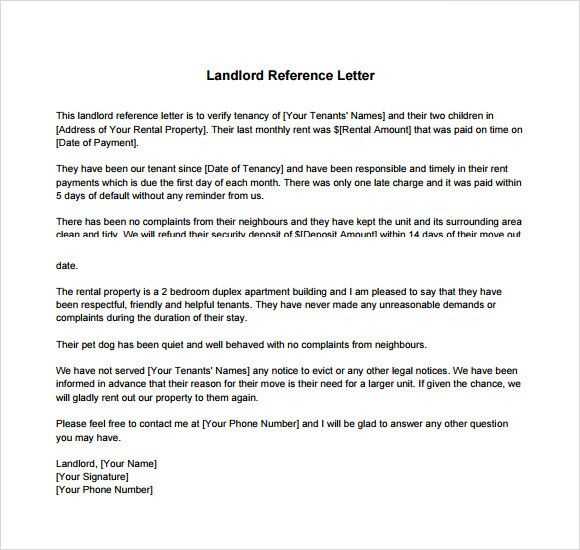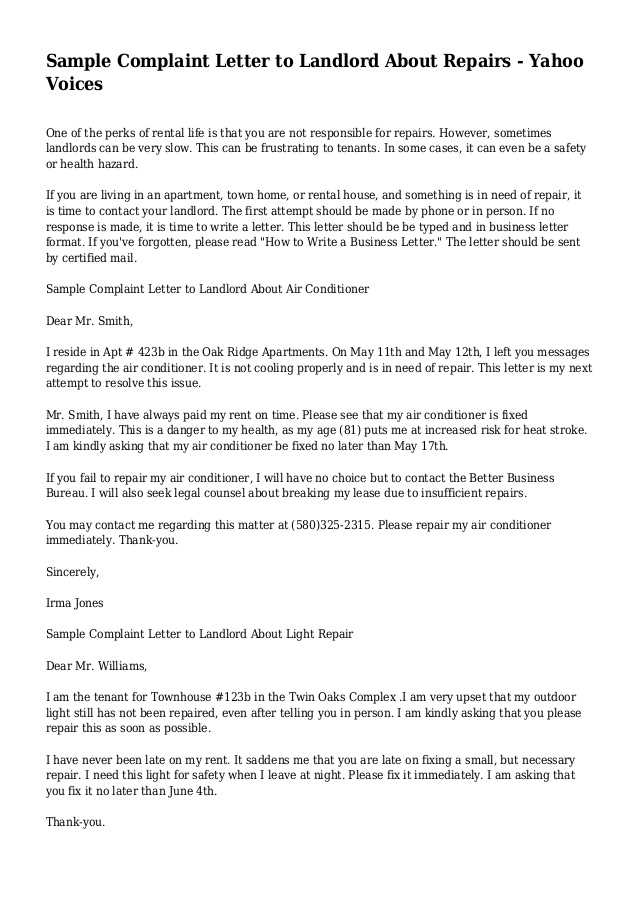Template Letter to Tenants from Landlord Guide

Clear and professional communication is essential when managing rental properties. Whether you need to remind residents of important dates, address maintenance issues, or communicate policy changes, crafting the right message can make a significant impact. A well-written note ensures that your intentions are understood and helps maintain a positive relationship with those residing in your property.
When drafting such communications, it is important to ensure clarity, respect, and adherence to legal guidelines. Customizing your messages to suit different situations allows you to effectively address various concerns while keeping the tone professional and courteous. The right approach can prevent misunderstandings and foster a respectful and cooperative living environment.
In this guide, we will explore how to structure these essential communications, the information to include, and tips for avoiding common errors. Whether you are sending a simple reminder or addressing a more formal concern, understanding the key elements of effective communication is crucial for successful property management.
Why Use a Tenant Letter Template
When managing a rental property, having a standardized approach for written communication can save time and reduce errors. A consistent structure ensures that important details are included every time, minimizing the risk of missing crucial information. Whether you are informing residents about upcoming inspections, rent changes, or maintenance schedules, a pre-drafted format allows you to focus on the specifics without worrying about the overall structure each time.
Using a standardized format also promotes professionalism. It ensures that all communications are clear, polite, and adhere to any legal requirements, reducing the chances of misunderstandings. With a reliable framework in place, you can address a variety of situations quickly and effectively, while maintaining a positive relationship with those residing in your property.
Essential Information to Include in Communications
Effective property management requires clear and concise communication. When preparing written messages for individuals residing in your property, it’s important to include all necessary details to avoid confusion and ensure clarity. Whether it’s a notification about rent adjustments, upcoming inspections, or maintenance schedules, specific information should be conveyed in a structured and straightforward manner.
Key Details to Include
Each communication should contain essential elements such as the date, the purpose of the message, and any deadlines or important dates. Additionally, consider including contact details for follow-up and providing clear instructions for the recipient if any action is required.
| Information Type | Description |
|---|---|
| Date | Always include the date the message is being sent to ensure accuracy and reference. |
| Purpose | Clearly state the reason for the communication, whether it’s about rent, maintenance, or policy changes. |
| Action Required | If any follow-up is needed, specify the steps the recipient should take. |
| Contact Information | Provide your contact details for questions or concerns. |
Additional Considerations
While the content should be clear and direct, ensure the tone remains professional and respectful. The format should also be easy to read, with a logical flow of information that helps the reader understand the message quickly.
Customizing Letters for Specific Situations

Each communication sent to individuals living in your property should be tailored to fit the specific context or situation. While a standardized format can save time, personalizing the content to reflect the nature of the message is crucial for clarity and effectiveness. Whether you are notifying someone about a rent increase, addressing a maintenance issue, or reminding them of their lease terms, the way the information is presented should align with the circumstance.
Adjusting Tone and Language
When customizing your message, consider the tone and language you use. For positive situations, such as confirming a maintenance appointment, the tone can be friendly and reassuring. For more serious matters, such as a rent increase or policy violation, a professional and firm tone is appropriate. Adapting the message to the situation helps convey your intentions clearly without causing unnecessary stress or confusion.
Specific Examples and Instructions

In some cases, including specific examples or clear instructions can be particularly helpful. For example, if a resident is required to make a payment or take corrective action, provide step-by-step guidance on how to proceed. When addressing issues like property damage or late payments, include relevant details, such as dates, amounts, and any legal implications, to ensure there is no misunderstanding.
Legal Considerations for Landlords When Writing
When preparing written communications for individuals residing in your property, it is important to be aware of the legal implications of what you write. Any message that addresses important matters such as rent payment, property maintenance, or lease terms must comply with local laws and regulations. Failing to follow legal guidelines can result in disputes, potential lawsuits, or financial penalties, which is why understanding the legal framework is essential.
Before sending any official communication, ensure that the content adheres to the terms of the lease agreement and the laws governing landlord-tenant relationships in your area. This includes not only the information presented but also the way it is worded. Being clear, concise, and respectful is crucial to avoid any claims of harassment or violation of tenant rights.
Additionally, landlords should be cautious when addressing issues such as late rent payments or property damage. There are often specific rules about how such matters must be communicated, including how much notice must be given before taking action. Legal considerations also extend to privacy, as landlords must ensure they do not disclose sensitive information without proper consent.
Common Mistakes to Avoid in Communications

When sending formal messages to individuals residing in your property, it’s essential to ensure the content is clear, accurate, and free from errors. Common mistakes in written communications can lead to confusion, misunderstandings, or even legal issues. By being mindful of these common pitfalls, you can ensure that your messages are effective, professional, and legally sound.
Using Ambiguous Language
Vague wording can often lead to confusion and misinterpretation. Avoid using terms that might have different meanings for the reader, as this could cause delays or misunderstandings. Always strive for clarity and precision in your wording, especially when addressing important matters like deadlines, payments, or actions required from the recipient.
Overlooking Legal Requirements
One of the most significant mistakes is failing to adhere to legal guidelines. Different areas have varying regulations when it comes to notifications regarding rent increases, evictions, or maintenance schedules. Ignoring these rules can result in disputes or penalties. Make sure to research local laws and ensure your communication follows the proper legal framework.
How to Maintain Professional Communication
Effective and respectful communication is essential for fostering a positive relationship between property owners and individuals residing in their properties. Maintaining professionalism in your messages ensures that your intentions are clear and helps avoid misunderstandings. Whether addressing concerns, setting expectations, or providing updates, your tone and approach can significantly influence the outcome of the interaction.
- Be Clear and Direct: Always communicate your message in a straightforward manner. Avoid ambiguity and ensure that the recipient understands exactly what is being asked or communicated.
- Use Respectful Language: A courteous and respectful tone helps maintain a positive atmosphere, even when discussing difficult topics. Treat the recipient with professionalism at all times.
- Stay Objective: Focus on the facts and avoid letting emotions influence the tone of your message. Keeping the discussion focused on the issue rather than personal feelings helps ensure a more constructive conversation.
By following these guidelines, you can create clear, respectful, and professional communication that helps resolve issues efficiently and strengthens the relationship with those living in your property.